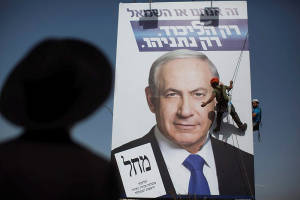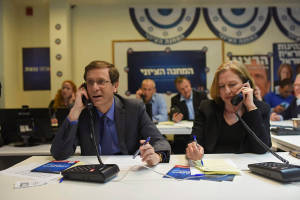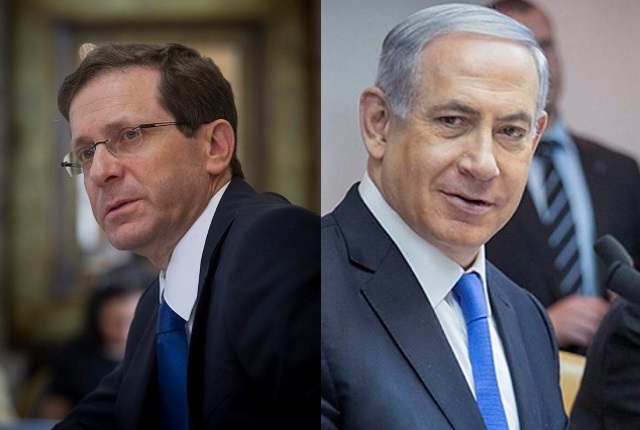Israeli citizens will participate in the only true democratic process in the Middle East this Tuesday, ending a particularly interesting campaign. The question is, will there be a clear front runner the morning after?
Israel’s citizens are less than 48 hours away from the opening of the elections ballots on Tuesday morning, when they will partake in the country’s robust democratic process and vote for the political party of their choice.
Israel is the only true democracy in the Middle East. All citizens can voice their opinions and influence leadership through a transparent, orderly process.

An Israeli looks on as a billboard-sized poster of PM Netanyahu is set up. (Yonatan Sindel/Flashh90)
While a few other Middle Eastern countries have semi-democratic processes, they are neither transparent nor inclusive and are often rigged.
Israel’s 120 members of the Knesset (MKs), Israel’s parliament, are directly elected by citizens to four-year terms, unless there is a call for early elections, which has become quite common and is the case in this round.
All Israeli citizens, regardless of race, religion and background, 18 years and older, may vote in legislative elections, which are conducted by secret ballot. Even convicted felons have the right to cast their ballots in Israel.
Anyone, with a few provisos related to criminal activity, could be elected to the Knesset, which represents all segments of Israeli society. In this legislative body, Jews, Arabs, Druze and others come together to serve at the helm of the country.
At the ballot, an Israeli may choose one of the 25 political parties running in the upcoming 20th Knesset. According to Israeli law, with few limitations, anyone can register to run for Knesset, promoting any concept. Some of the political parties aspire to offer a comprehensive plan to lead Israel, while others focus on specific topics, such as the Green Party that spotlights environmental issues.
The leader of the largest party is usually instated as prime minister. However, political machinations can influence and change that. Each elected party will go to President Reuven Rivlin, and recommend one of the candidates they see fit to serve as prime minister. Usually, the leader who receives the most recommendations is tasked with establishing a coalition.
Tensions, Politics and Building a Government
This election campaign has been marked by personal and acrimonious battles between the party leaders, and specifically between Prime Minister Benjamin Netanyahu and opposition leader Isaac Herzog of the Labor party.
The main focus of the debates has been on security-related issues – specifically the Iranian nuclear threat and Netanyahu’s special address to the US Congress on that topic. Economic issues, namely, the growing cost of living in Israel, have also been a campaign focus.

Zionist Camp leaders Herzog and Livni call potential voters. (Ben Kelmer/Flash90)
The latest polls show that there is a neck-to-neck tie between Netanyahu’s Likud party and Herzog’s Labor party, which he named “The Zionist Camp” for the current round of elections. Some polls give Herzog a slight lead on Netanyahu.
A Channel 10 News poll from Friday gave The Zionist Camp 24 seats and the Likud received 20.
The Joint Arab List received 13 seats, followed by the national-religious Jewish Home and Yair Lapid’s Yesh Atid party, each with 12 seats. Kulanu, headed by Moshe Kahlon, had 10 seats, while the Ultra-Orthodox parties Shas and United Torah Judaism each got seven.
Yisrael Beitenu, Yachad and the extreme left-wing Meretz came in last with five seats each, according to the Channel 10 poll.
A second poll conducted by Channel 2 News gave The Zionist Camp a four-seat advantage as well, giving it 26 seats – four seats over the Likud’s 22.
The Joint Arab List got 13 seats in the poll; Yesh Atid, 12; Jewish Home, 11; Kulanu, 8; Shas, 7; and United Torah Judaism, 6.
Meretz, Yisrael Beytenu and Yachad round out the list in this poll as well with 5 seats each. Other polls showed they may not pass the mandatory threshold of 4 seats.
It is of significance to note that in the past, polls have been off the mark in predicting voting results, so many questions regarding Israel’s next leadership remain open.
Both leaders, Netanyahu and Herzog, would be faced with the difficult task of forming a coalition of at least 61 members. The current configuration of the party build-up indicates that Netanyahu has a better chance of establishing a majority government.
The situation on the Israeli street is tense, and all eyes are turned towards the exit polls, which will be published at 10 PM on Tuesday night.
The final exact results will be known only a few days after Tuesday’s election day, as the soldiers’ and diplomats’ votes need to be counted.
After that, the country will be faced with a period of uncertainty, during which the president will choose the candidate whom he believes has the highest likelihood of cobbling together a coalition. Then, the aspiring prime minister will negotiate with his prospective coalition partners. Once a deal is reached, the new government will be formed and the various ministerial portfolios will be distributed according to the agreement.
By: Aryeh Savir
Staff Writer, United with Israel
Do You Love Israel? Make a Donation - Show Your Support!
Donate to vital charities that help protect Israeli citizens and inspire millions around the world to support Israel too!
Now more than ever, Israel needs your help to fight and win the war -- including on the battlefield of public opinion.
Antisemitism, anti-Israel bias and boycotts are out of control. Israel's enemies are inciting terror and violence against innocent Israelis and Jews around the world. Help us fight back!
